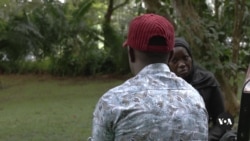ທ້າວແຟຣັງຊິສ ມູກີຊາ (Francis Mugisha), ເປັນຜູ້ຊ່ຽວຊານທາງດ້ານເທັກໂນໂລຈີຂໍ້ມູນຂ່າວສານ, ສາມາດເດີນທາງກັບຄືນເມືອສູ່ອູການດາໄດ້ແລ້ວ, ລຸນຫຼັງຝັນຮ້າຍຈາກປະສົບການຢູ່ໃນເອເຊຍ.
ລາວກ່າວວ່າ ມັນເລີ້ມຕົ້ນຂຶ້ນຫລັງຈາກທີ່ລາວເຂົ້າມາເຮັດວຽກເປັນຜູ້ຈັດການດ້ານຂໍ້ມູນ ແລະ ເປັນຜູ້ຊ່ຽວຊານທາງດ້ານໄອທີຢູ່ໃນ ສ.ປ.ປ ລາວ.
ບໍ່ດົນຫຼັງຈາກທີ່ລາວເດີນທາງໄປຮອດ, ທ່ານ ມູກີຊາ ກ່າວວ່າ ເຈົ້ານາຍຂອງລາວບອກລາວວ່າ ລາວຕິດໜີ້ພວກເຂົາໃນຈໍານວນເງິນ 16,000 ຢວນ, ເຊິ່ງເທົ່າກັບ 2,225 ໂດລາ. ແລະເງື່ອນໄຂໃນການເຮັດວຽກຂອງລາວກໍໄດ້ປ່ຽນແປງຢ່າງກະທັນຫັນ.
ທ້າວແຟຣັງຊິສ ມູກີຊາ ກ່າວວ່າ:
“ຂ້ອຍບໍ່ເຄີຍຄາດຄິດວ່າຊິມີຜູ້ໃດມາບອກຂ້ອຍ ວ່າເຈົ້າເປັນທາດຂອງຂ້ອຍ, ເຈົ້າຕ້ອງເຮັດວຽກໃຫ້ຂ້ອຍ.”
ທ້າວ ມູກິຊາ ກ່າວວ່າ ພວກເຂົາເຈົ້າເກັບຮັກສາໜັງສືຜ່ານແດນ ແລະ ໂທລະສັບຂອງລາວໄວ້ ແລ້ວຂາຍລາວໃຫ້ບໍລິສັດອື່ນທີ່ມີສໍານັກງານໃຫຍ່ຕັ້ງຢູ່ໃນມຽນມາ, ໂດຍສົ່ງລາວໄປທາງເຮືອລ່ອງຕາມລໍາແມ່ນໍ້າຂອງ. ແຕ່ແທນທີ່ລາວຈະເປັນຜູ້ເຮັດວຽກກ່ຽວກັບການຈັດການຂໍ້ມູນ, ລາວຊໍ້າພັດຖືກບັງຄັບໃຫ້ດໍາເນີນການຫຼອກລວງທາງອອນລາຍ.
ວີດີໂອນີ້ສະແດງໃຫ້ເຫັນເຖິງຜູ້ເຄາະຮ້າຍໄວໜຸ່ມຄື ທ້າວ ມູກີຊາ ເຊິ່ງຖືກບັງຄັບໃຫ້ໄປທຳການຫຼອກລວງທາງອອນລາຍກັບບັນດາພວກຜູ້ຊາຍທີ່ໃສ່ເຄື່ອງແບບທະຫານ.
ທ້າວ ມູກີຊາ ກ່າວວ່າ ລາວໄດ້ຖືກບັງຄັບໃຫ້ເຮັດວຽກຫຼາຍຊົ່ວໂມງພາຍໃຕ້ເງື່ອນໄຂທີ່ຫຍຸ້ງຍາກທີ່ສຸດ.
ທ້າວ ມູກີຊາ ກ່າວວ່າ:
"ຖ້າພວກເຈົ້າຫາຄົນບໍ່ໄດ້, ມັນແມ່ນມື້ທີ່ພວກເຂົາຈະກ່າວວ່າ ບໍ່ມີຜົນຜະລິດ. ດັ່ງນັ້ນ, ເຈົ້າກໍຈະຖືກລົງໂທດໃນທີ່ສຸດ ໂດຍການຖືກໄຟຟ້າຊັອດ, ຖືກຕີ, ແລະ ຖືກກັກຂັງ. ບາງຄັ້ງ, ເຈົ້າກໍຕ້ອງຖືກໂສ້ມັດໄວ້ກັບເກົ້າອີ້. ຄືດັ່ງທີ່ເຈົ້າເວົ້າວ່າ 'ບໍ່, ຂ້ອຍເຮັດວຽກບໍ່ໄດ້, ຂ້ອຍຢາກອອກໄປ,' ເຂົາກໍຈະມັດເຈົ້າໃສ່ຕັ່ງໃນທັນທີ.”
ທ້າວ ມູກີຊາ ກ່າວວ່າ ໃນທີ່ສຸດລາວກໍສາມາດອອກໄປໄດ້ດ້ວຍການຕິດຕໍ່ຫາຄົນຫລາຍເທົ່າທີ່ລາວຈະເຮັດໄດ້, ໂດຍການຕິດຕໍ່ຫາສະຖານທູດຕ່າງໆເພື່ອຂໍຄວາມຊ່ວຍເຫຼືອ ແລະການສະໜັບສະໜຸນຈາກອົງການຍຸຕິທຳສາກົນ, ອົງການສິດທິມະນຸດສາກົນທີ່ບໍ່ຂຶ້ນກັບລັດຖະບານ, ແລະສະຖານທູດອູການດາປະຈໍາມຽນມາ.
ເຈົ້າໜ້າທີ່ໃນນະຄອນຫຼວງກຳປາລາກ່າວວ່າ ຊາວອູການດາປະມານ 30 ຄົນກໍາລັງຖືກກັກຂັງພາຍໃຕ້ສະພາບການທີ່ຄ້າຍຄືກັນນີ້ຢູ່ໃນມຽນມາ, ໃນຂົງເຂດທີ່ຖືກຢຶດຄອງໂດຍພວກກະບົດທີ່ຕໍ່ສູ້ກັບລັດຖະບານທະຫານຂອງປະເທດ.
ເຈົ້າໜ້າທີ່ກ່າວວ່າ ພວກເຂົາຖືກດຳເນີນການໂດຍກຸ່ມກໍ່ອາຊະຍາກຳທີ່ໄດ້ຮັບການຈັດຕັ້ງຂອງຈີນ ພວກທີ່ມັກລັກລອບເອົາຜູ້ເຄາະຮ້າຍຜ່ານໄປທາງປະເທດເຄັນຢາ. ບັນດາຜູ້ເຄາະຮ້າຍ ຕົກຢູ່ໃນກໍາມືຂອງແກັ້ງຕ່າງໆເຫຼົ່ານັ້ນ ເມື່ອພວກເຂົາເຈົ້າເດີນທາງໄປຮອດເອເຊຍ.
ທ່ານເດີຣິກ ບາຊາເລີວາ ຄີເກັນຢີ (Derrick Basalirwa Kigenyi), ຮອງຜູ້ປະສານງານດ້ານການປ້ອງກັນການຄ້າມະນຸດແຫ່ງຊາດຂອງ ອູການດາ.
ທ່ານ ກ່າວວ່າ ລັດຖະບານອູການດາ ໄດ້ຍົກເອົາເລື້ອງນີ້ເປັນສໍາຄັນກັບນາຍົກລັດຖະມົນຕີ ທ່ານມິນ ອອງ ແລງ (Min Aung Hlaing) ຂອງມຽນມາ, ຜູ້ທີ່ໄດ້ໃຫ້ຄຳສັນຍາວ່າ ຊາວອູການດາທີ່ຖືກປ່ອຍໂຕ ຈະບໍ່ຖືກຈັບໃນຂໍ້ຫາທີ່ພົວພັນກັບການເຂົ້າເມືອງ.
ທ່ານ ຄີເກັນຢີ ກ່າວວ່າ:
“ແຕ່ແນ່ນອນ, ພວກເຂົາຍັງຍອມຮັບວ່າ ບໍລິເວນດັ່ງກ່າວຖືກຄວບຄຸມໂດຍພວກກະບົດ. ດັ່ງນັ້ນ, ສິ່ງໃດກໍຕາມທີ່ກ່ຽວຂ້ອງກັບສິ່ງທີ່ພົວພັນນໍາເລື້ອງຂອງພວກທະຫານບ້ານທີ່mມີກົດໝາຍພຽງເລັກໜ້ອຍ ແມ່ນຕົກຢູ່ໃນໃນສະພາບການທີ່ຊັບຊ້ອນຫຼາຍ.”
ໂຄສົກຂອງກອງທັບມຽນມາ ບໍ່ໄດ້ຕອບສະໜອງຕໍ່ຄຳຮ້ອງຂໍຂອງ VOA ເພື່ອໃຫ້ຄວາມເຫັນຕ່າງໆ.
ທ່ານນາງມີນາ ຊຽງ (Mina Chiang), ຜູ້ກໍ່ຕັ້ງຂອງກຸ່ມທີ່ບໍ່ຫວັງຜົນກໍາໄລ, ເຊິ່ງເປັນກຸ່ມທີ່ປຶກສາດ້ານການຄົ້ນຄວ້າທາງດ້ານມະນຸດສະທໍາ, ໂດຍຕໍ່ສູ້ຕ້ານການຄ້າມະນຸດ. ນາງກ່າວວ່າ ກຸ່ມແກັ້ງຕ່າງໆ ແມ່ນແນເປົ້າໝາຍໃສ່ຄົນທີ່ເວົ້າພາສາອັງກິດ ແລະພາສາອື່ນໆ ທີ່ສາມາດໃຊ້ເພື່ອການຫລອກລວງຄົນຢູ່ນອກປະເທດຈີນ.
ທ່ານນາງ ມີນາ ຊຽງ ກ່າວວ່າ:
“ຊາວອາຟຣິກາຕາເວັນອອກ ພາກັນເວົ້າພາສາອັງກິດໄດ້ດີ. ດັ່ງນັ້ນ, ກໍຫມາຍຄວາມວ່າມັນງ່າຍຫຼາຍເມື່ອເວົ້າເຖິງການຫລອກລວງ, ທີ່ພວກເຂົາອາດຈະສາມາດແນເປົ້າໝາຍໃສ່ຄົນຈາກປະເທດອື່ນໆ, ຫຼາຍກ່ວາພຽງແຕ່ພາຍໃນປະເທດຈີນ. ນອກນັ້ນ, ບາງຄັ້ງ ພວກອາຊະຍາກອນກໍຕ້ອງການໃຊ້ຜູ້ເຄາະຮ້າຍໂທທາງວິດີໂອ ເພື່ອຫລອກລວງບັນດາຜູ້ເຄາະຮ້າຍ. ຈາກນັ້ນ ພວກເຈົ້າຕ້ອງການໃຜຜູ້ນຶ່ງທີ່ສາມາດເວົ້າພາສາອັງກິດໄດ້, ແມ່ນບໍ? ຄືກັບວ່າ ເຈົ້າເອົາຄົນຈີນທີ່ເວົ້າພາສາອັງກິດບໍ່ໄດ້ ມັນກໍອາດຈະຍາກຫຼາຍທີ່ຈະເຮັດໜ້າທີ່ດັ່ງກ່າວນັ້ນ."
ທ່ານນາງ ຊຽງ ກ່າວວ່າ ການເຄື່ອນໄຫວທາງອາຍາແມ່ນໄດ້ຮັບການປົກປ້ອງໂດຍການສໍ້ລາດບັງຫຼວງເປັນລະບົບຢູ່ໃນມຽນມາ, ທັງຢູ່ໃນບໍລິເວນທີ່ຖືກຄວບຄຸມໂດຍລັດຖະບານທະຫານ ແລະພວກກະບົດ, ບ່ອນທີ່ບັນດາບຸກຄົນຕ່າງໆມີອຳນາດ ແລະບ່ອນລີ້ໄພຂອງລັດຖະບານ ສໍາລັບກຸ່ມແກັ້ງອາຊະຍາກຳທີ່ມີສໍານັກງານໃຫຍ່ຢູ່ໃນປະເທດຈີນ.
The Ugandan government says about 30 Ugandans are stuck in Myanmar, being forced to work as online scammers. Officials say they were lured there by traffickers with the promise of a job and are now being held by gangs who run the scamming operations. Halima Athumani and Mukasa Francis have more from Kampala where they spoke with other Ugandans who managed to make it back home.
Francis Mugisha, an information technology expert, is back in Uganda, after a nightmare of an experience in Asia.
He says it began after he took a job as a data manager and IT specialist in Laos.
Not long after his arrival, Mugisha says his bosses told him he owed them 16,000 Chinese yuan, the equivalent of $2,225 dollars. And the conditions of his job abruptly changed.
Francis Mugisha, Forced to Work for Online Scammers,
“I never expected someone to come and tell me you are my slave. You have to work for me.”
Mugisha says they kept his passport and phone and then sold him to another company based in Myanmar, sending him by boat on the Mekong River. But instead of managing data, he was forced to conduct online scamming.
This video purports to show young victims like Mugisha being driven to a compound for online scamming with men wearing military uniforms.
Mugisha says he was forced to work long hours under harsh conditions.
Francis Mugisha, Forced to Work for Online Scammers.
“If you don’t get a person, it’s a day which they will say is not productive. So, you end up being punished, being electrocuted, being beaten. Being locked up. At times, you are chained to the chair. Like if you say, ‘No, I cannot work, I want to go,’ they chain you to a chair.”
Mugisha says he managed to finally get out by contacting as many people as he could, reaching out to embassies to get help and support from the International Justice Mission – an international rights NGO – and the Uganda Embassy in Myanmar.
Kampala officials say about 30 Ugandans are being held under similar conditions at Myanmar compounds, in areas held by rebels fighting the country’s military junta.
Officials say they are run by Chinese organized crime gangs who often smuggle victims through Kenya. The victims fall into the hands of the gangs once they reach Asia.
Derrick Basalirwa Kigenyi is Uganda's deputy national coordinator for the prevention of
human trafficking.
Kigenyi says Ugandan authorities raised the matter with Myanmar’s Prime Minister Min Aung Hlaing, who promised that Ugandans who are released will not be held on immigration-related charges.
Derrick Basalirwa Kigenyi, Deputy National Coordinator for Prevention of Trafficking,
“But of course, they also acknowledged that the area is rebel-controlled. So, anything that involves lawlessness in militia context is quite complex.”
A spokesman for the Myanmar military did not respond to VOA requests for comment.
Mina Chiang is the founder of the non-profit group,
Humanity Research Consultants, which fights human trafficking. She says gangs target people who speak English and other languages that can be used to scam people outside of China.
Mina Chiang, Human Research Consultants, Zoom.
“East Africans do speak good English. So that means it’s easier when it comes to scamming, that they may be able to target other nationalities, more than just Chinese. Also, sometimes the criminals want to use the victims to have video calls to scam the victims. Then you need somebody who can actually speak English, right? Like if you put a Chinese who doesn’t speak English then it would be hard to do that kind of job.”
Chiang says the criminal activity is protected through systemic corruption [3:25] in Myanmar, both in junta- and rebel-controlled areas, where powerful individuals and governments shelter the China-based criminal gangs.






ຟໍຣັມສະແດງຄວາມຄິດເຫັນ